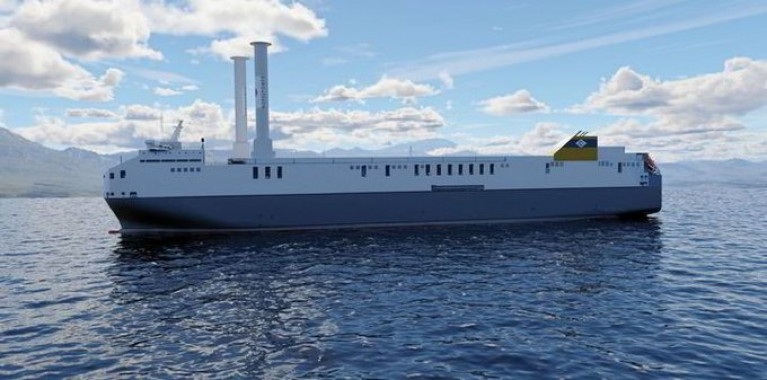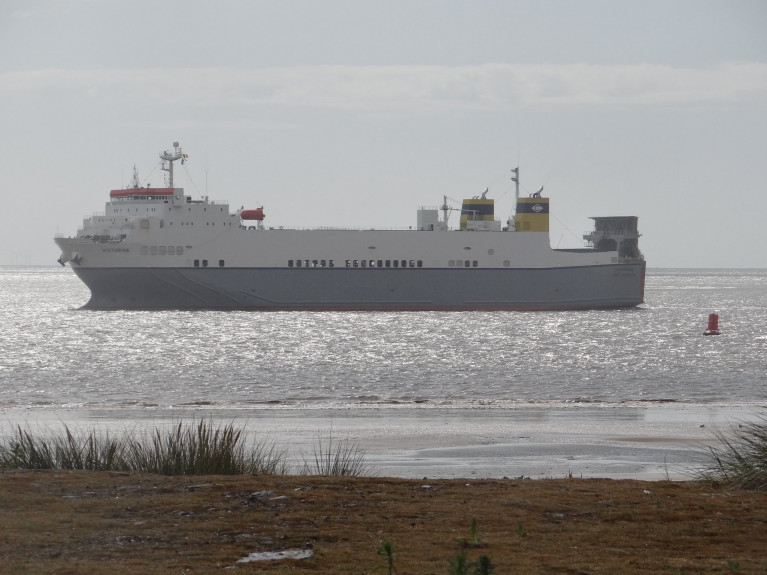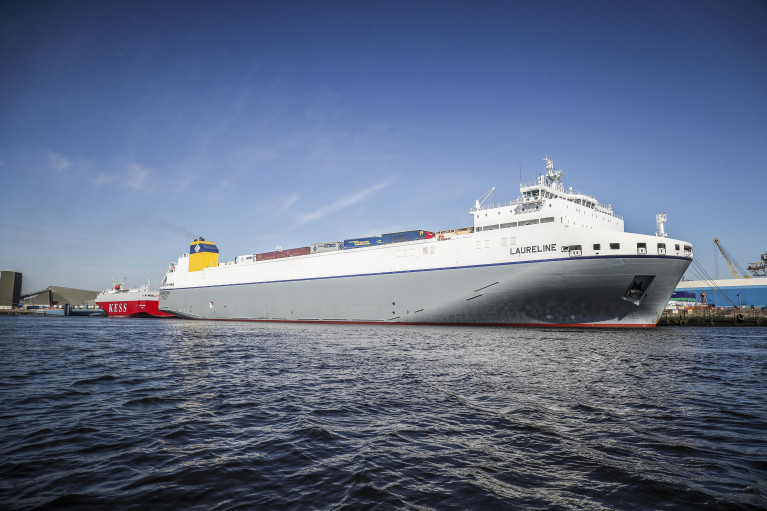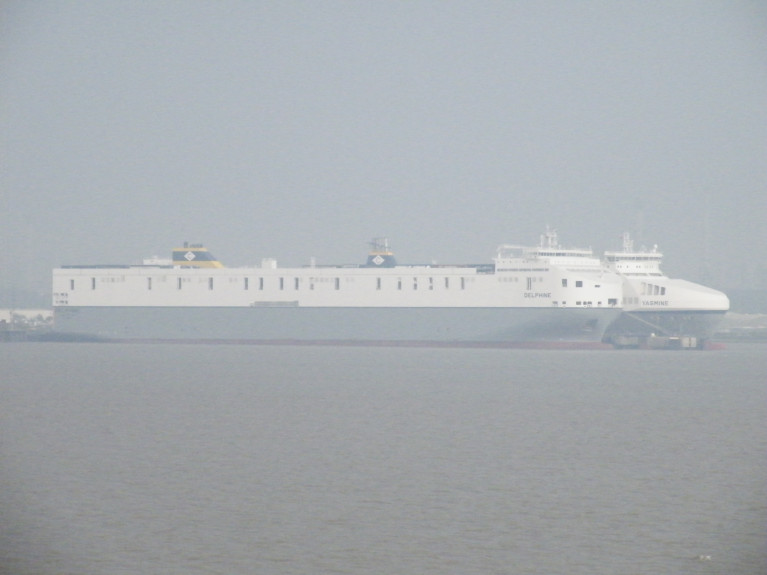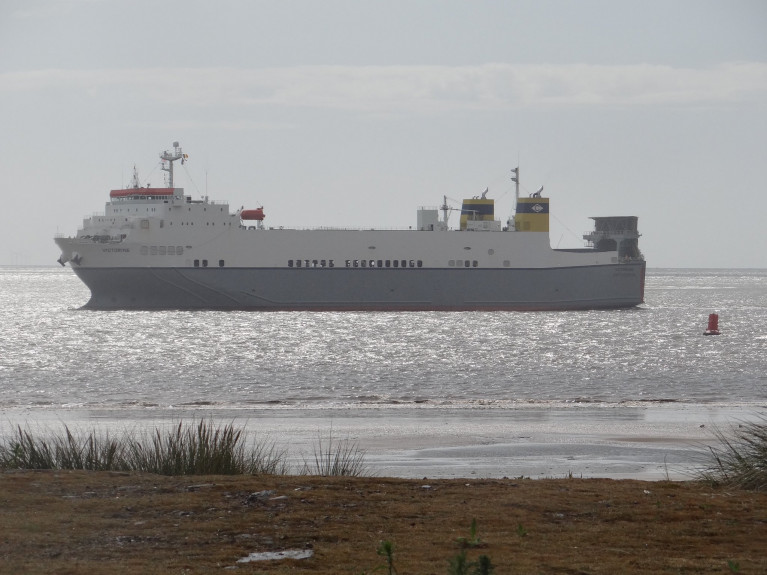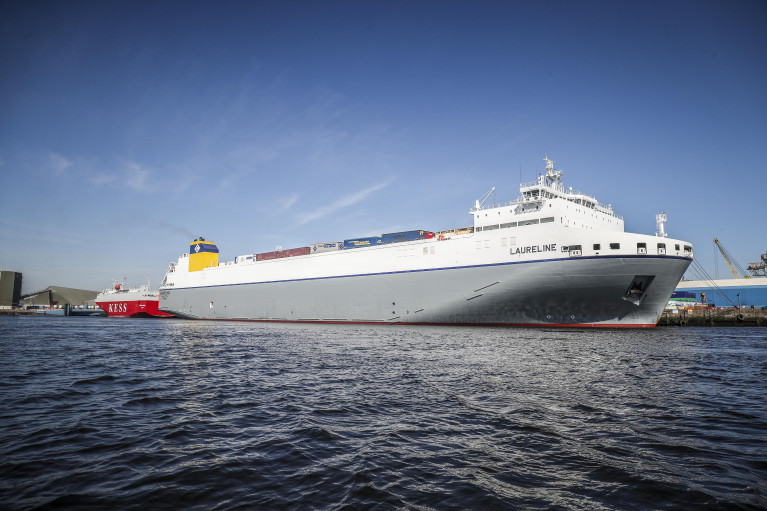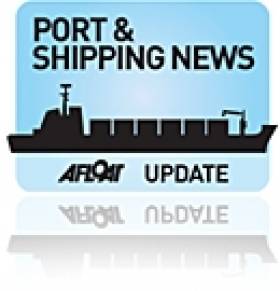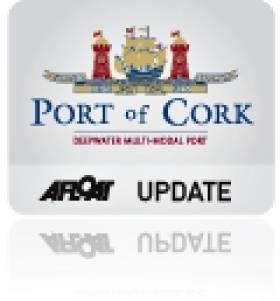Displaying items by tag: CLdN
CLdN to Launch New Port of Cork-Rotterdam (Lo Lo) Route and Expand Capacity Between the Dutch Port & UK
Compagnie Luxembourgouise de Navigation (CLdN) has announced the launch of a new container route between the Port of Cork and Rotterdam that is to start this month.
Operating the route is CLdN Ro Ro S.A., which is chartering two 962 TEU lift-on/llift-off (LoLo) cargo vessels, the M/V Pavo J and MV Andromeda J, that will ship containers between Rotterdam (where CLdN recently acquired the Distriport terminal) Dublin and Cork.
The introduction of the new LoLo services will also enable an optimization of CLdN’s roll-on and roll-off (RoRo) fleet deployment, thereby increasing capacity on the routes between Rotterdam and the UK.
The addition of the new services responds to high levels of customer demand to move freight between Ireland and mainland Europe. The two additional weekly LoLo sailings complement the three RoRo sailings operated by CLdN each week to and from Dublin. These RoRo services will continue to operate from CLdN’s RoRo terminal in Rotterdam.
The LoLo service to Cork complements the existing RoRo service opened in 2020 by CLdN from its Zeebrugge terminal. The new services will be operational as of the week commencing March 18.
CLdN has grown its presence on the Irish trades significantly since the inception of its first cargo service to Ireland in 1999, with the most recent expansion being announced in December last year when an additional 3.5 hectares of terminal area were added in Dublin.
Today, CLdN ships some 500,000 cargo units a year to and from Ireland, making it the largest mover of ferry freight between Ireland, mainland Europe, and Great Britain. Following the addition of the new lines, CLdN will operate the following Irish services in each direction every week:
Rotterdam ⟷ Dublin: 5 sailings
Rotterdam ⟷ Cork: 1 sailing
Zeebrugge ⟷ Dublin: 2 sailings
Zeebrugge ⟷ Cork: 2 sailings
Santander ⟷ Dublin: 2 sailings
Liverpool ⟷ Dublin: 60 sailings
Heysham ⟷ Dublin: 6 sailings
In addition to the above direct sailings, CLdN offers extensive transhipment possibilities to the East Coast of England (London, Killingholme, and Teesport), Spain, Portugal, Denmark, and Sweden.
CLdN Ro Ro also operates 11 weekly sailings between Heysham and Warrenpoint, which Afloat.ie highlights were originally part of the network of Irish Sea routes run by Seatruck Ferries, which CLdN acquired in 2022, along with the Dublin-Liverpool/Heysham routes. The brand Seatruck has recently been discontinued, marking the end of an era of the company, whose origins began in 1996.
Commenting on the additional capacity, Florent Maes, CEO of CLdN, said: “The addition of these services is a direct benefit of the recent Distriport acquisition and an example of CLdN’s ability to find innovative and timely solutions for its customers.
The trade flows between Ireland and mainland Europe are significant, and CLdN is pleased to be able to further expand its offering in this area.
CLdN Announce Intallation of 'Rotor Sails' On the World's Largest Short Sea Ro-Ro Freight Vessel
CLdN, the logistics specialist for road, sea and rail is to install two tilting Rotor Sails on board a 2018-built ro-ro vessel, the MV Delphine which is the largest short sea RoRo vessel operating in the world.
The MV Delphine, a vessel with a cargo capacity of close to 8,000 lane meters, transits between the UK, Ireland and Europe (see story). A sister Celine, was dubbed the 'Brexit-Buster' following introduction in the same year on Dublin-mainland Europe routes to Belgium and The Netherlands.
With two 35mx5m Rotor Sails, Norsepower Oy Ltd in Finland, has estimated that the technology would achieve a fuel and emission reduction saving of between 7 to 10% for the MV Delphine, depending on the route.
The Norsepower Rotor Sail Solution - which can be installed on new vessels or retrofitted on existing ships - is a modernised version of the Flettner rotor, a spinning cylinder that uses the Magnus effect to harness wind power to thrust a ship. At the time of contract signing, this will be the seventh vessel to be installed with Norsepower’s Rotor Sails.
Tuomas Riski, CEO, Norsepower, commented on the agreement: “Seeing the interest grow in our tilting Rotor Sail design demonstrates how the industry is looking for proven, flexible solutions to lower carbon emissions and reduce fuel costs across a range of vessel sizes and operations.
“Norsepower’s Rotor Sail installation on the MV Delphine demonstrates how the use of clean technology can modernise and evolve the performance of fleets’ younger vessels to manage emissions and help to increase asset value. With fuel becoming increasingly expensive, making savings will also have a huge impact on commercial success. Working with CLdN and its ambitious team is an opportunity to demonstrate what our technology has to offer to continue strengthening the environmental and commercial performance of its fleet.”
Gary Walker, COO Shipping, CLdN, added: “In 2021, CLdN announced it is the top performer amongst its ro-ro shipping peers in Northwest Europe for CO2 emissions per tonne of freight carried. By investing in technologically advanced ships and terminals, CLdN enables its customers to improve their carbon footprint and support them at the same time in making their supply chains more efficient and robust. This demand for cleaner shipping is growing and we are committed to making measurable progress. Installing two of Norsepower’s Rotor Sails will maximise our fuel and emissions savings on the MV Delphine, and this pilot project will help determine how the Rotor Sail technology could be rolled out on the current CLdN fleet and our new-build vessels. We look forward to the installation and subsequent results.”
The Norsepower Rotor Sail is the first third-party verified and commercially operational auxiliary wind propulsion technology for the global maritime industry. The solution is fully automated and detects whenever the wind is strong enough to deliver fuel and emission savings, at which point the Rotor Sails start automatically. This is the third installation of the tilting Rotor Sail function, highlighting the growing interest in the flexibility of the latest design.
Freight-ferry operator, CLdN Ro Ro having announced additional sailings on UK and Irish routes out of Zeebrugge, Belgium, is in a next step to increase capacity and frequency on its Iberian service.
The RoRo operator announced the bi-weekly service calling both to Liverpool and Dublin Port out of Santander, Spain as from this week.
Currently CLdN is operating a weekly service out of Santander, calling Liverpool and Dublin separately. The company was forced to detach the respective services at the beginning of this year, as a direct result of Brexit.
Thanks to being an Authorized Economic Operator (AEO), complying with most strict customs and safety and security regimes, the company is now in a position to combine intra EU and non-EU sailings and is to re-introduce the triangle trade: Santander-Liverpool-Dublin-Santander, twice a week.
Leaving Santander each Saturday and Wednesday, arriving in Liverpool on Monday and Friday and subsequently calling Dublin on Tuesday’s and Saturday’s.
A spokesman commented on the expansion of the services:” Driven by the success of our youngest unaccompanied routes from the Iberian Peninsula directly to the UK and Ireland, the market can benefit from increased capacity and frequency shortly. Allowing our customers to increase turnaround times of their equipment and rely on a robust service bypassing the Landbridge, with its administrative burdens".
"We are confident this will give a boost to our services and is the right answer to growing market demand, the modal shift from accompanied to unaccompanied transport and to designing sustainable supply chains with a low carbon footprint“
Freight Ro-Ro Operator CLdN Shows Ability to React Directly to Markets in Post-Brexit Era
Operator CLdN having overcome the challenges of the first two months of this year in the post-Brexit era, has increased shipping capacity by the introduction of additional sailings on its Irish and UK routes.
Getting a vessel back from charter enables the RoRo operator to increase service levels on the Zeebrugge – Dublin service to three sailings per week imminently to cope with risen demand.
(Afloat.ie speculates the chartered ro-ro is Hermine, same class of leadship Laureline, which is currently in the North Sea but is due to Dublin Port this Friday from Zeebrugge).
A spokesman commented on the expansion of the UK and Irish services: “Once more, CLdN shows its ability to react directly to market developments in order to keep serving its customers with a robust, reliable and cost efficient transport solution. We are poised to maintain our leading role in unaccompanied short sea shipping and will keep interacting with our valued customers in order to meet their expectations."
More here reports Multimodal.
CLdN which operates Ireland-mainland Europe routes served by freightferry ro-ro 'Brexit-Busters' tonnage, is to step up preparations for the end of the Brexit transitional phase on 31st December 2020 by introducing additional capacity on its UK routes. (See: Brexit 'Freeports story).
As from last week, Multimodal reported, that 25% extra capacity was added on both the Rotterdam -London and Rotterdam - Humberside routes. In addition, and from week 42, an extra vessel will be deployed and thus a third daily sailing will be added on the Zeebrugge – London route to serve the growing demand.
Over the last months, CLdN have seen a steady growth in customer demand for its reliable, low cost and Brexit -proof unaccompanied freight product. Shipping unaccompanied trailers, (tank) containers, finished vehicles or project cargo between its own ferry terminals provides a ‘one stop shop’ to get goods shipped across the North Sea without running the risk of disruption.
In recent years, CLdN has invested heavily in a fleet of modern vessels with environmentally friendly credentials offering high capacities for freight crossing the North Sea, Irish Sea and Bay of Biscay. The company has maintained its regular sailing schedules on all routes throughout the difficult Covid period and is there to serve the market with robust and reliable products going forwards.
CLdN plays an essential part in the logistics of all types of goods on a network of services among them as alluded in the introduction the Irish services which are Dublin-Zeebrugge-Rotterdam. (Afloat.ie adds a lo-lo service is also maintained by the containership Arx which today is at anchorage In Dubin Bay during a routine layover in between sailings).
In total the network of short sea services connects the following European ports; Rotterdam (NL) and Zeebrugge (BE) to London (UK), Humberside (UK), Liverpool (UK), Dublin (IE), Cork (IE) as well as Santander, (ES), Porto (PT) Gothenburg (SE) and Esbjerg (DK).
CLdN Celebrate Second Service Linking Iberian Peninsula to Liverpool & Dublin Port
Freight-ferry operator CLdN and UK ports group, Peel Ports celebate the addition of a second ferry service linking the Iberian peninsula to Liverpool and Dublin Port.
The new weekly service connecting Leixoes, Portugal to the UK and Irish ports, follows the success of the first pure RoRo service between Santander in Spain, Liverpool, and Dublin as Afloat.ie reported in June.
Afloat adds this service was opened by Victorine.
According to Peel Ports, whilst most new services take time to build market confidence, these new connections have already proved a huge success, further increasing frequency and capacity on CLdN’s Irish and UK services from continental Europe.
The enhanced service offers cargo owners and hauliers the chance to utilise longer maritime routes, switching to unaccompanied trailers to improve the overall productivity of the driver pool.
Liverpool is a key port for the Atlantic and Irish Sea trades and this new route between Iberia and Liverpool, will provide both Irish and US exporters alike, with a reliable, fast and direct route for their customers, including those in northern Britain. Market uncertainty, related to COVID and Brexit, has presented a number of ongoing issues within the supply chain, affecting long distance European haulage and driver availability. This new service will mitigate all these risks.
Sjors Bosvelt, Head of Sales, CLdN said: “Since launching the triangular route in June, plus Porto, Dublin, Liverpool sailings, we have continued to progressively expand our route network. The new Portuguese service, which commenced on 11th September with the arrival of Japanese built Kawasaki Class vessel, Clementine into Liverpool, will offer environmental benefits and be less prone to disruptions or interruptions as seen on the short straights, as well as increased coverage of direct shipment possibilities from Iberia to UK and Ireland.”
Port of Cork Welcomes New Route to Mainland Europe With Ro-Ro Service By CLdN this Friday
A new Port of Cork-mainland Europe service has been warmly welcomed with the announcement by CLdN Ro-Ro SA of a weekly ro-ro freight service between the Irish port and Zeebrugge in Belgium.
The new service, which begins operations this Friday (24 April), is part of a significant expansion by CLdN of its freight services between Belgium and the Republic of Ireland. (Afloat adds CLdN launched the 'Brexit-buster' ship Celine in 2018 followed by Laureline last year on the Dublin Port-Belgium/Netherlands services).
The Ro-Ro service will leave Zeebrugge on every Friday to arrive in Cork on Sunday. The ro-ro freight ship will return on Tuesday arriving in Zeebrugge again on every Thursday.
CEO of Port of Cork, Brendan Keating, said; “This announcement by CLdN will greatly support our efforts in the Port of Cork to keep supply chains moving during the current Covid-19 pandemic. The Port has been actively looking at ways to bolster its freight activity and is delighted to partner with a company that enjoys such a great reputation in the shipping industry. Introducing this new connectivity to Zeebrugge not only helps Port of Cork to protect supply chains during the current crisis, but also adds a direct freight-only link with the heart of Europe.”
Port of Cork Chairman, John Mullins, said; “This is a very exciting development for both the Port of Cork and CLdN. In these unprecedented times this direct freight link with Europe from Ireland’s primary southern gateway will reinforce the Port’s commitment to supporting businesses in the region and preparing for any eventuality Brexit may still bring.”
The Port of Cork has implemented a contingency plan to ensure freight operations continue as normal during the COVID-19 pandemic. The Port is a key facilitator of trade in the Munster region, and vital deliveries will continue to several sectors in the weeks ahead.
#dublinport - Celine, otherwise dubbed the Brexit-Buster following the giant ro-ro ship's christening ceremony almost a year ago in Dublin Port, is to be bolstered with additional sailings linking Ireland directly with mainland Europe.
The operator of Celine, CLdN Ro-Ro SA, based in Luxembourg, which had previously published a fleet development programme, has announced the expansion of its Irish service due to newbuilds entering service.
According to the short-sea operator this week, dedicated vessels were to be deployed to operate on the direct Dublin-Rotterdam trade route. This will offer an increase from three to four sailings in each direction, whilst improving the spread of the sailings and increasing capacity, at a time when Brexit uncertainty is a major feature in clients planning.
Three of the sailings will use Ro-Ro vessels, departing from Rotterdam on a Tuesday, Thursday and Saturday and from Dublin Thursday, Saturday and Monday. In addition one Lo-Lo vessel (Afloat adds, the Arx) will sail ex Rotterdam on Saturday and ex Dublin on Tuesday.
The expansion enables customers to maximize equipment turnaround without having to rely on land-bridge solutions going forwards, thus strengthening the direct Irish Continental trade.
The Dublin-Zeebrugge service will for the present time remain to the existing schedule, but the intention of the operator is also to develop this route also, as additional tonnage comes on line.
A spokesperson for CLdN Ro-Ro SA stated: “These further developments are in line CLdN’s long- term strategy, supported by substantial investments in both terminals and fleet, guaranteeing our customers continuity and a solid service on the Irish corridor for many years to come. It also shows the company’s ability to adapt to challenging market conditions, and our customers’ demands, in a very flexible and rapid way.”
Export Industry Awards to Deep and Short Sea Shipping
Eucon Shipping and Transport Ltd won the Short Sea Shipping Company of the Year Award 2011, sponsored by the Irish Maritime Development Office (IMDO), which recognises the strategically important role of short sea shipping to our economy. Eucon offers Irish exporters access to worldwide markets via its regular feeder services to Rotterdam, Antwerp and Southampton operating from the ports of Dublin, Cork and Belfast. The other nominees were: CLdN RoRo S.A. and Grimaldi Lines.
In the category for the Logistics Company of the Year Award 2011, sponsored by Dublin Port Company, the award went to Caffrey International. The Co. Meath based company is a specialist provider of road transport and logistics services between Ireland, the UK and continental Europe.
The award recognises the importance of logistics and supply chain management firms to the exporting effort of companies trading internationally from Ireland. The other nominees were: DHL Global Forwarding (Ireland) Ltd., Dublin; Eucon Shipping and Transport Ltd. and Geodis Ireland Limited, Dublin.
ABC Nutrition of Shannon was presented with the overall award of the Exporter of the Year Award 2011 after winning in the Emerging Markets Exporter Award, one of twelve categories which were presented at the ceremony.
Port of Cork Announce New Weekly Container Service
The decision to establish a direct continental link to the Port of Cork further establishes CLdN's position in Ireland as a key logistics partner to the regions importers and exporters, and shows confidence in CLdn's ability to supply a reliable, market leading and cost conscious service which will assist their clients in the current tough economic climate.
The Port of Cork is the key seaport in the south of Ireland and due to its favourable location and modern facilities, the Port of Cork is ideally positioned to assist CLdN in the development of its quality containerised shipping service between Southern Ireland and the strategic ports in France, The Netherlands and Belgium. A well-developed road network will ensure good transit times both to and from the port, ensuring a reliable service offering to CLdn customers.
According to CLdN: 'CLdN intends to build upon its significant investment in the Irish market to date in an effort to bring further initiatives to the market to improve the reliability and cost effectiveness required to allow importers and exporters of Ireland maintain a competitive edge in their selected markets.'
Commenting on the new containerised service, Captain Michael McCarthy Commercial Manager Port of Cork said: 'This new service will offer industry in Ireland a competitive choice of routes to market which will contribute to the current competitiveness of the Irish import and export sector. It also emphasises the strategic position of the Port of Cork as recent figures released by the Irish Exporter Association state that the export market has seen an increase of 8% to date and is expected to continue to grow in 2011.'
CLdN, whose Irish offices are located in Dublin and Cork ports, have forged long term partnerships with both suppliers and customers and intend to expand operations in Ireland over the coming years to ensure that the market continues to provide their customers with the infrastructure to assist in their continued success. CLdN was awarded the Irish Exporters Association Shortsea Shipping Company of the Year for 2010 reflecting the positive impact their services have on their members.


























